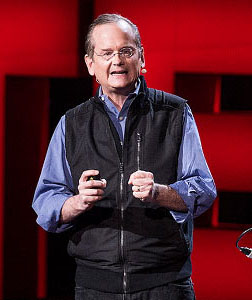Money in politics is “a big problem” and “ Lawrence Lessig is right”?
Apr 26th, 2013 | By Counterweights Editors | Category: Key Current IssuesOne thing about life in the global village nowadays is that the subtleties of political debate keep getting lost in the demands of 140-characters-or-less, and similar rules elsewhere. (And if you think things were always that way, try reading a 19th century newspaper.)
A case in point glows brightly in this past Wednesday’s Washington Post WONKBLOG, which deals with burning questions submitted by readers. The question in this case – “Is Lawrence Lessig right?” – is answered by the estimable Ezra Klein, who we follow on twitter, etc.
At a mere 80 words, Klein’s answer is admirably concise (as well as politely promotional) : “In general, yes. Specifically? I think Lessig errs in seeing money as the primary ill in American politics. I’d argue that our worst problems are driven by the catalytic interaction of party polarization and a political system designed for consensus. That said, money in politics is a big problem, Lessig’s written the very best book on the subject, and so yes, Lawrence Lessig is right, and people should listen to him. You can read my review of his book here.”
If you click on the here, here, you will arrive at Ezra Klein’s review of two books –Â Jack Abramoff’s Capitol Punishment: The Hard Truth About Washington Corruption from America’s Most Notorious Lobbyist, and Lawrence Lessig‘s Republic, Lost: How Money Corrupts Congress–and a Plan to Stop It – in the March 22, 2012 issue of the New York Review of Books. And if you actually read this review (which weighs in at 4800 words), you will almost certainly come away with a rather different impression of Ezra Klein’s evaluation of Lawrence Lessig than you took from Wednesday’s WONKBLOG.
Two faces of Ezra Klein on Lawrence Lessing ????
“Almost certainly” are of course strong words (well, more or less). Yet several of us at this location have now taken the test, and we all seem to agree. Ezra Klein’s evaluation of Lawrence Lessig’s current “We the People, and the Republic we must reclaim” campaign sounds considerably more positive in the April 24, 2013 Washington Post WONKBLOG (80 words) than it does in the March 22, 2012 issue of the New York Review of Books (4800 words).
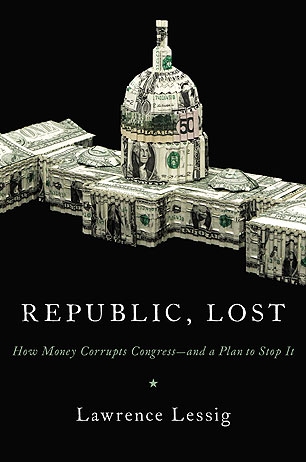 It is true enough that when you go back to the WONKBLOG evaluation a second time, you are reminded that Klein does begin with : “I think Lessig errs in seeing money as the primary ill in American politics. I’d argue that our worst problems are driven by the catalytic interaction of party polarization and a political system designed for consensus.”
It is true enough that when you go back to the WONKBLOG evaluation a second time, you are reminded that Klein does begin with : “I think Lessig errs in seeing money as the primary ill in American politics. I’d argue that our worst problems are driven by the catalytic interaction of party polarization and a political system designed for consensus.”
On the other hand, Ezra Klein does end his WONKBLOG 80 words with: “That said, money in politics is a big problem, Lessig’s written the very best book on the subject, and so yes, Lawrence Lessig is right, and people should listen to him.” And, so far as we can see, there is no such ultimate almost ringing endorsement in the New York Review of Books piece
(What Klein does say in his 4800 word review, eg, is that Lessig is making “two separate points … One is that the rise of money is behind the decline in trust in government. The other is that money empowers ideologues and alienates the middle. Neither claim stands up to scrutiny.” And: “Which isn’t to say that it wouldn’t be worthwhile to get the money out of politics … But it’s not clear that any set of campaign finance reforms or anti-lobbyist regulations would restore trust in government or ratchet down partisan polarization. Such policies, if they worked, would likely have more modest effects … as big a problem as money is in politics … it is not the only one, and it is probably not even the worst one.”)
The medium is the message ??
You could say that one kind of rational part of the difference here is that in his WONKBLOG evaluation Ezra Klein is responding to readers’ questions that almost certainly flow from Lawrence Lessig’s new 18-minute TED talk, “We the People, and the Republic we must reclaim” – released on the Internet just a few weeks ago, on April 3, 2013.
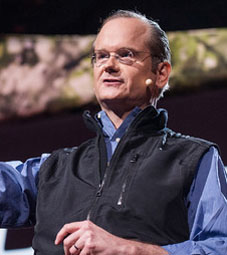 Here at counterweights we have all seen this latest Lessig TED talk now – and marvelled at the communication skills it displays. None of us, alas, have yet actually read Lessig’s latest book, Republic, Lost: How Money Corrupts Congress–and a Plan to Stop It (the subject of Ezra Klein’s piece in the New York Review of Books last year).
Here at counterweights we have all seen this latest Lessig TED talk now – and marvelled at the communication skills it displays. None of us, alas, have yet actually read Lessig’s latest book, Republic, Lost: How Money Corrupts Congress–and a Plan to Stop It (the subject of Ezra Klein’s piece in the New York Review of Books last year).
The substantive message is no doubt broadly the same. Yet in another sense (and as a famous Canadian once prophesied), “the medium is the message.” It may just be (and we could certainly understand if it is) that the TED talk is just that much more impressive because of the medium. And so Ezra Klein, who has almost certainly now seen the new TED talk himself, is somewhat more positive in his evaluation of this version of Lawrence Lessig’s current money-is-the-root-of-all-evil-in-the-US-Congress campaign, than he was when he had just read the book.
One thing we think the Lessig TED talk does brilliantly is clarify the way in which the increasing domination of money in US Congressional elections – or of what Lessig calls the Lesters or the funders in his 18-minute talk – dysfunctionally narrows the range of policy options presented to We the People in general elections. The tiny minority of big funders act as “in the words of the X Files shape shifters,” while freshman Congressmen (and women) are advised to “lean to the green.” (And, Lessig stresses, green in this case does not mean the environment).
Health care in the United States and Canada
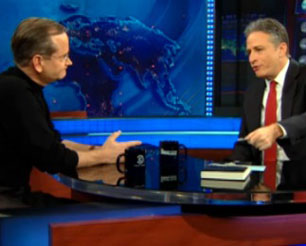 Our commentary here does not have any of the Lessig virtues in “We the People, and the Republic we must reclaim.” And we must quickly bring it to an end. The last thing we want to comment quickly on, being Canadians as we are and cannot escape, is just what if anything Lawrence Lessig’s kind of analysis has to do with Canada.
Our commentary here does not have any of the Lessig virtues in “We the People, and the Republic we must reclaim.” And we must quickly bring it to an end. The last thing we want to comment quickly on, being Canadians as we are and cannot escape, is just what if anything Lawrence Lessig’s kind of analysis has to do with Canada.
It is at least a commonplace of current Canadian political thought that we do not really have the same kind of problem with money in politics as our American brothers and sisters – for the unhappy (or happy, depending on your point of view) but quite simple reason that there is just nowhere near as much money in Canada as there is in the United States.
It may be true as well that we have had some sensible campaign finance reform (or at least had until Stephen Harper came along). Thus Rick Salutin has recently written that Jean Chretien in his 10 years as Prime Minister of Canada “accomplished exactly one thing: a negative. He avoided the Iraq War. (His electoral finance reform got dismantled by Stephen Harper.)”
Just this past Monday the Nanaimo Daily News (and no doubt other parts of the canada.com network) rather more helpfully explained :“In 2004, Jean Chrétien’s Liberal administration introduced a ban on business and labour donations. Of course, that deprived both parties of the funds needed to run a campaign … To make up the difference, a political subsidy was created. Parties were guaranteed $2.04 from the public purse for each vote they received … The federal Conservative government is now in the process of phasing out this subsidy. But the question remains: How are the lost corporate and union donations to be made up?”
We won’t try to answer this last question. (And note that there are possible public subsidies for presidential but not congressional campaigns in the United States: here is Wikipedia on the current state of the art, in Canada and the United States.) Presumably, however, Lessig would say that Mr. Harper’s decision to phase out this public subsidy in Canada is not a helpful move.
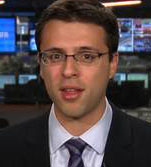 One very final thought does occur to us here. We adopted universal public health care in Canada back in the late 1960s – long before any of the current debates about money in politics anywhere got under way. (And at about the same time that the more partial but still impressive Medicare and Medicaid programs began in the USA.) It does strike us, however, that the lack of our kind of universal public health care option in the recent US debate that ended with Obamacare” (which no one really likes), is probably a good example of the kind of problem Lessig is pointing to. And in the very end we would just second Ezra Klein’s latest short message: “Lawrence Lessig is right, and people should listen to him.”
One very final thought does occur to us here. We adopted universal public health care in Canada back in the late 1960s – long before any of the current debates about money in politics anywhere got under way. (And at about the same time that the more partial but still impressive Medicare and Medicaid programs began in the USA.) It does strike us, however, that the lack of our kind of universal public health care option in the recent US debate that ended with Obamacare” (which no one really likes), is probably a good example of the kind of problem Lessig is pointing to. And in the very end we would just second Ezra Klein’s latest short message: “Lawrence Lessig is right, and people should listen to him.”
